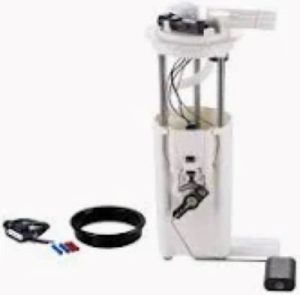Verily, a faulty fuel pump is the main reason behind any car not starting as the fuel pump delivers petrol from tank to engine in expected pressure. If there is not enough fuel then the air-fuel mixture will not ignite and combustion will not happen. An estimated 1 in 10 no-start complaints among motorists are fuel system-related, and a study by the National Institute for Automotive Service Excellence (ASE) found that faulty, such as failed fuel pumps top this list of causes.
One of the clearest signs that a bad fuel pump has gone bad, this only happens when you crank and there is no way for the engine to start. What this means simply is that, the fuel pump will be unable to pressurize or prime the fuel system, thereby without allowing any fuel into your engine. The pump's job is to maintain the pressure of 40~70psi on a modern fuel-injected system and if the pump sucks, then your engine will have problems starting or wont start at all. Being able to check the fuel pressure (using a gauge) can help you to further confirm that a lack of pressure is behind the absence of gas traveling thru' the fuel rail.
In my case, an intermittent starting problem is likely due to a bad fuel pump. The pump can still intermittently work, turning over the engine a fully to sometimes start, but as it gets closer to going out, those starts will become more infrequent. Another clear sign is if your vehicle starts (if only briefly) before stalling as the fuel pump will not be maintaining constant fuel pressure at all times.

However, electrical problems inside the fuel pump system can cause issues as well. If the pump does not receive this power, the fuse could have blown or the fuel pump relay is defective. Fuses cost generally $1-$5 each to replace, while a fuel pump relay usually range from $20-$50. This stage of diagnostics should check those electrical components are not a simple rectification.
Another reason a fuel pump may go out and the car will not start is fuel contamination. Sediment, dirt or water running through the fuel external pump can simply clog the pump or damage its internal components making it fail. It's wise to have the fuel filter replaced at regular intervals (every 30,000 to 40,000 miles is a common schedule). One of the most common reasons, as mentioned in a 2021 study by Consumer Reports is clogged fuel filters; which leads to an early failure of the fuel pump and that translates into starting issue.
To quote Henry Ford,, “Failure is simply the opportunity to begin again, this time more intelligently. In the case of automotive systems, frequent service and earlier detection of fuel pump problems can prevent a more serious matter such as a no-start condition.
So, to sum it all up definitively — Yes, a failed fuel pump will cause your car to not start, be it total lack of fuel pressure trigger by an intermittently functioning, or just plain electrical failure. To diagnose or replace your fuel pump, see our Fuel Pump.
